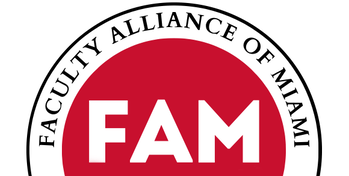A couple of important items related to academic freedom:
1) “Over the weekend, during a speech to activists at the Conservative Political Action Conference, President Trump pledged to issue an executive order that would deny federal research funds to colleges and universities that do not ‘support free speech.’ AAUP’s position on this is clear. We strongly support freedom of expression on campus and the rights of faculty and students to invite speakers of their choosing. And we support the institutional autonomy of colleges and universities and the roles of faculty, administration, and governing boards in institutional decision-making. The president’s proposal is a dangerous solution to a largely nonexistent problem.”—AAUP. Please sign this petition against the executive order.
2) Last week, Miami’s General Counsel gave a useful presentation on academic freedom. We have made it available to you below. Know your rights in and out of the classroom.
During any discussion of academic freedom, it’s important to remember that Miami policy declares tenure to be “a means…to freedom of teaching and research.” Right now, the majority of faculty at Miami are on short-term contracts and can be terminated without cause. These faculty don’t enjoy the academic freedoms that economic security entails.
Miami AAUP continues to work to reduce the precarity of Miami faculty. Our students and our community will be better served when faculty aren’t fearful of losing their jobs or struggling to keep food on the table.
Presentation on Academic Freedom – Robin Parker, General Counsel (Feb. 25 Senate minutes, Attachment A-I)
a) The First Amendment is complex and dense. The only place that freedom of speech and academic freedom is protected is public institutions, although many private institutions adopt similar policies.
• WHO and WHERE: Your freedoms depend on who you are (Visitor, Student, Employee) and where (Public or non-public forum) you stand. Our policies relegate uninvited visitors to the perimeter sidewalks (street preachers, etc.). Students have the campus as an open forum, but are governed by time, place and manner rules.
• For employees, the question becomes whether they are speaking as a citizen or a public employee. Your teaching and research are covered by Academic Freedom. You may teach and research as you see fit. Outside of the classroom and the lab, and as a professor/instructor you have the rights and obligations of any citizen. Measure the urgency of these obligations in the light of your responsibilities to your subject to your students, to your profession, and your institution.
b) Senators were reminded that curriculum is delegated by the Board of Trustees as the responsibility of Senate. Academic freedom stipulates that how that curriculum is taught is up to the faculty member. Faculty have rights of any citizen; however, they cannot assert individually-held positions as representative of Miami University. When doing official and “regular” business as an employee, faculty are not free to say whatever they wish. However, when acting as a citizen outside the normal duties, you are free to say anything, including critical view of the institution.
c) Questions and comments during discussion:
1. When signing a petition, it is best to use your home address, not a campus address.
2. In student and faculty interactions, students have a larger right to freedom of speech than faculty. Faculty cannot hold students accountable for agreeing with them. If students say offensive things about their professors, the professor cannot retaliate because the students are exercising their First Amendment rights. If there are offensive statements in the classroom, the faculty member is to try to regain control of the classroom. The classroom is not an open forum, and the student can be
reported.
3. When students are demeaning toward each other, the faculty member has an obligation to have a classroom free of bias and can stop the conversation.
4. If faculty are asked for their opinion on an issue, they are to present as much as they can as neutrally as possible. This is also true is the discussion becomes political. If it is relevant to the discussion, orient it to where it can be useful, and ensure the discussion is well informed and addresses the facts.
5. When studying abroad, Miami sets the rules, and the professor can have additional rules for their student. If there aren’t any special rules for the students, they are governed by the rules of the country.
6. Cell phone numbers that are on the syllabus are public record. Additionally, texting on your personal phone regarding University business is also a matter of public record.


Leave a Reply